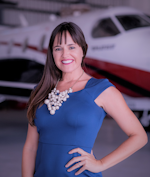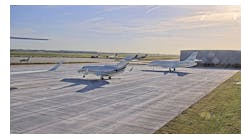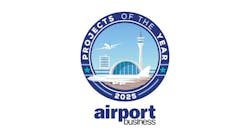How General Aviation is Helping Support Commercial Aviation and Prop Up Tourism in Specific Markets, Amid COVID-19 Resurgences
The short-term future of aviation is impossible to predict with consideration to the global Coronavirus pandemic. It has outlasted even the devastating effect 9/11 had on the industry-- which saw a timeline of slow, steady recovery. The subsequent spikes of COVID-19 are causing ebbs and flows of consumer confidence in travel.
Particularly for isolated markets that depend on tourism, like the Virgin Islands, it has been challenging for the local economies to withstand the long road back to normalcy. However, in the aftermath of COVID-19 surges, data shows a hopeful pattern of general aviation far less reduced than commercial aviation.
Statistics from NetJets show that commercial flights in September were down 57 percent year over year, while business aviation flights were only down 12 percent. For travelers who were previously on the fence about flying private, the Coronavirus pandemic and minimizing the risk of exposure has tipped the scales. Companies and individuals who can afford it are chartering flights versus staying grounded.
According to a WINGX COVID-19 impact report from mid-November, "business aviation activity continues to be much more resilient than scheduled airlines." As a worldwide rollout of COVID-19 vaccines is underway, charters continue to gain appeal for those who desire to continue flying. Some passengers travel for medical treatments or visit ailing family members — trips that cannot await the pandemic's end.
Watching this trend toward general aviation first-hand is the Standard Aviation team, a fixed-base operator on St. Thomas in the U.S. Virgin Islands, and part of the Air Elite network under World Fuel Services. Opening the largest free-span building in the Caribbean in July, they saw the mega yacht community remain in the region far beyond their regular season — versus repositioning to the Mediterranean. While hurricane season was quiet, as usual, the 2020-2021 tourism high season has brought a multitude of new and repeat visitors. With the British Virgin Islands reopened in December and in-house partners offering fixed- and rotor-wing connections, the Standard Aviation team, has seen clientele finding creative ways to still vacation amid chilly winter temperatures.
According to research by GlobeAir, a jet operator in Austria, flying private significantly reduces the risk of contracting Coronavirus versus commercial airline travel. The study cites a potential 700 touchpoints exposing commercial passengers to the risk of contagion on a single commercial flight. On the contrary, a business aviation flight has a mere 20 touchpoints. The analysis showed a typical roundtrip charter flight requires interaction with 12 or fewer people, including FBO team members. This count includes ground transportation drivers, both before departure and after arrival.
Research studies like this reinforce that many affluent consumers will continue to travel despite the state of the Coronavirus pandemic, except in cases of local government lockdowns. By streamlining a passenger's path to the airport, driving directly onto the ramp and walking immediately onto a sanitized aircraft, private flights offer a safer travel option in today's current climate. The only personnel with whom charter flight passengers are in contact are masked pilots and security or customs officials in one-on-one settings — where applicable. Private jet clientele bypass all the lines and crowds that statistically hold a higher chance of COVID-19 exposure.
The need for alternate tourism sources is made even more significant by the jilted cruise industry's situation. The U.S. Virgin Islands Bureau of Economic Research cites that 1,433,122 tourists visited the territory via cruise ship in 2019. But after cruising came to an abrupt halt in March 2020, the annual total was a bleak 440,398, down nearly 70 percent. A significant piece of tourism that is helping to fill that financial void is the heavy yacht industry.
Adding to private jet travel's seclusion and safety, many St. Thomas jet arrivals are in-bound to hangar their jet in Standard Aviation's 24,000 square foot hangar and board their yacht. Whether owned or chartered, the private plane to mega-yacht connection offers affluent travelers the opportunity to still vacation with minimal risk all-around. These vacations at-sea provide imperative stimulus dollars to the port of embarkation, income for crews, along with provisioning income at numerous destinations.
While these pricey travel options are not within reach for most, they do help stimulate tourism-based economies. Airports, financially devastated by the drop in commercial flights since the Coronavirus pandemic began, benefit from landing fees accumulating on the general aviation side. And while it will not fill the void entirely, private aviation sustaining numbers or only seeing nominal drops presents airports' opportunity to minimize layoffs and remain financially sound until commercial aviation recovers.
General aviation helping commercial bridge the gap to normalcy is especially real for isolated island environments in the Caribbean, which depend on visitors, some as independent nations without financial backers. A late October 2020 study by the travel insurance company SquareMouth found that Caribbean destinations ranked highest for American travelers for the first time. Year-over-year travel to the U.S. Virgin Islands increased by a compelling 207 percent.
Topping the list was the Turks and Caicos, with an increase of 303 percent in the SquareMouth study. According to Provo Air Center, general aviation traffic in 2020 increased over 2019. The Air Elite FBO team saw approximately 20 percent more flights in November and 25 percent more in December.
The WINGX Dec. 15, COVID-19 impact report concurred, stating, "There are some resilient spots, evident in high-end leisure destinations, particularly warm-weather resorts in the Caribbean." The Jan. 7 WINGX report solidified the trend, summarizing holiday travel. "The driver for the Christmas holiday surge from the U.S. was clearly demand for getaway locations. Flights from the U.S. to Caribbean destinations saw a major rebound in U.S. tourists." WINGX research cited arrivals into St. Maarten up 15 percent; 32 percent growth to Costa Rica; and almost 70 percent growth in Antigua/Barbuda's flights versus December 2019.
Charter flights to such vacation destinations offer privacy, knowing and trusting each of the small group of passengers on an aircraft. They also provide the opportunity to depart on-demand versus awaiting a scheduled commercial flight and continuing potential COVID-19 exposure in airports, restaurants, etc. Sharing the air in the same confined commercial aircraft with hundreds of unmasked strangers may take years to be widely accepted again. In turn, a new breed of charter flight customers is adding to the market.
Non-traditional private flight options are emerging amid the Coronavirus pandemic. SharedCharter launched in October to connect charter passengers with others interested in extra seats according to the origination location, planned destination(s), and scheduled itinerary. Sites such as this one put flying private within financial reach for an expanding market of consumers.
In a December 2019 media presentation put together by national advocacy group No Plane No Gain, it was cited that business aviation adds $200 billion to the U.S. economy annually — this group is sponsored by the National Business Aviation Association and the General Aviation Manufacturers Association. Of the 5,000 public airports in the country, commercial airlines serve fewer than 500 of them. General aviation passenger flights landing at smaller domestic airports help support mail and cargo services as well. Bringing more than $2.5 million in economic stimulus to the airport and community where it is based, a single private jet facilitates jobs, brings in tax dollars, and beyond. These figures further illustrate how business aviation benefits local economies and communities, not just those on-board.
It is imperative for all involved to remain hopeful for a swift recovery industry-wide at this uncertain juncture for aviation. The mass distribution of COVID-19 vaccines will likely instigate an aviation industry boom with the potential to offset this period of hardship.
A positive case study for this is Royal Jet Group in the United Arab Emirates (UAE), another Air Elite property. A representative shared in the Middle East, confidence in travel has increased since the vaccine's mass distribution has started throughout the country, which began in the fourth quarter of 2020.
In the Caribbean, markets shaken by the sudden loss of visitors via cruise ship and with a large gap in commercial flights benefit from private aviation helping fill the void. Soon consumer confidence will be fully restored, and people worldwide will be more eager than ever to travel.
Ashley Bouzianis is the marketing director at Standard Aviation, the luxury FBO on St. Thomas in the U.S. Virgin Islands. She was honored as the top woman in Caribbean aviation in 2019, receiving the Sapphire Pegasus Business Aviation Award. Bouzianis also serves on the World Fuel Services Air Elite Board of Directors.





